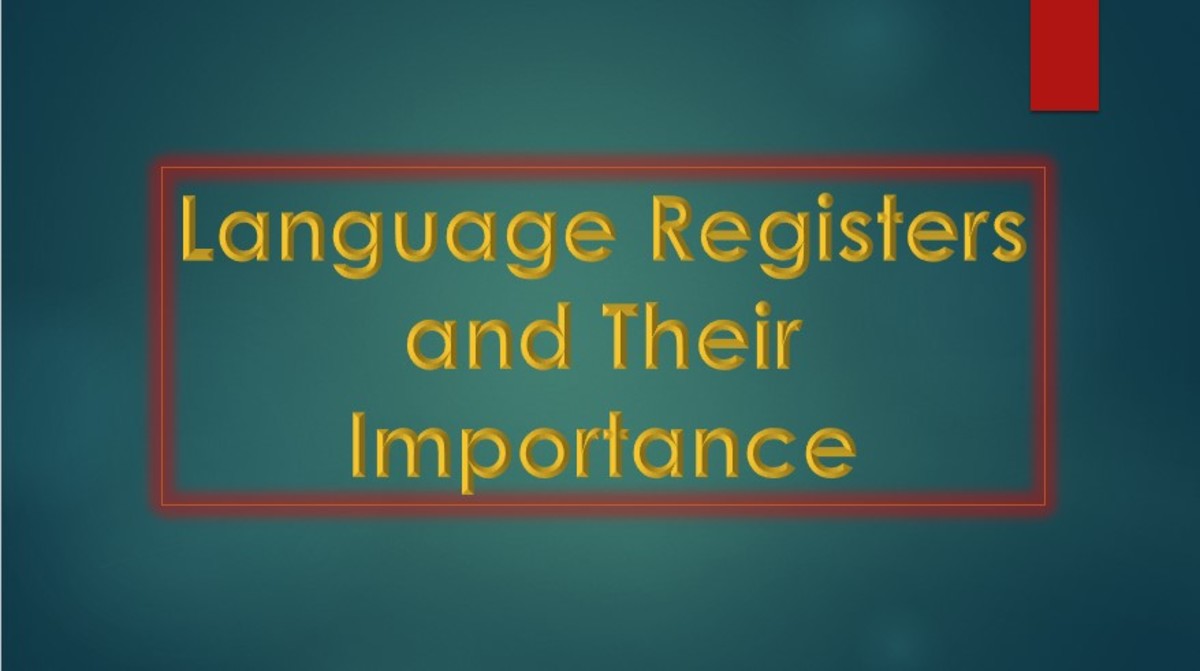Why We Must Preserve Our Linguistic Resources and Save Dying Languages
Vanishing Linguistic Resources
Right now, this minute and every minute, languages with only a few speakers left are dying, everywhere around the world, from large countries like the United States and Russia, and from tiny islands and remote regions. 40% of the world's 7,000 existing languages are in danger of becoming extinct. If we allow these languages to vanish, we will lose the worldviews and linguistic programming of the people who speak them. More importantly, as we learn a foreign tongue, the physical structure of our brain is reshaped to accommodate the new information and linguistic programming, and if we allow native speakers of a language to die off, we will lose valuable research opportunities into understanding the human brain. And who knows what works of literature or poetry could emerge from these languages that will enrich all of us?
Another language is dying as you read this; at present, a language dies every two weeks. We must support research and social efforts to save these communities where native languages are dying out, if we have any hope of retrieving the valuable linguistic information these languages and their speakers have. It is as important an issue as the vanishing of species of animals or plants, and often far more easily dismissed.
Linguistics in Fiction
The Sapir-Whorf Hypothesis, or Linguistic Relativity
Linguistic relativity is the theory that our access to language circumscribes our access to thought--that since we think in language, our ability to think concepts is limited by our language. Writers have used this concept extensively:
- H.P. Lovecraft's short story "The Unnamable" (1923) asks whether you can think about an idea which cannot be described.
- Ayn Rand's Anthem (1938) is about a society where anyone who uses the word "I" is put to death.
- Jorge Luis Borges's Tlön, Uqbar, Orbis Tertius (1940) explores how language shapes the world.
- George Orwell's novel Nineteen Eighty-Four (1949) asks whether we can revolt, if we cannot form the words to express the ideas underlying a revolution. The appendix on Newspeak says that "a heretical thought ... should be literally unthinkable, at least so far as thought is dependent on words."
- Jack Vance's novel The Languages of Pao (1958) revolves around an experiment in shaping a civilization by modifying its language. The main character, Lord Palafox, says "We must alter the mental framework of the Paonese people, which is most easily achieved by altering the language." Finisterle, his son, says "every language impresses a certain world-view upon the mind."
- Robert A. Heinlein's Stranger in a Strange Land (1961) posits that language limits the abilities, and by learning Martian, people develop new abilities they could not express in English.
- Samuel R. Delany's novel Babel-17 (1966) has a fictional language that prevents creative thought, forcing purely logical thought. This language is like a virus, because it is supposed to convert everyone who learns it.
- Ursula K. Le Guin's novel The Dispossessed (1974) has a constructed language where it is almost impossible to talk about possessive relationships.
- Suzette Haden Elgin's novel Native Tongue (1984) relates a patriarchal society in which oppressed women develop a secret "feminist" language.
- Iain M. Banks's science fiction series, the Culture (1987 onward) has a shared language, Marain. The Culture believes that language affects society, and Marain, the Culture's language, was designed to exploit this effect.
- Neal Stephenson's novel Snow Crash (1992) postulates that the Sumerian language was a programming language for the human brain.
- In Ted Chiang's "The Story of Your Life," (1998) language directly determines thought. The characters who learn to speak the alien language learn to see their life as not separate disconnected periods of time, but as a single connected action.

The Value of Different Languages
Two quotes, one by Edward Sapir, and the other by Benjamin Whorf, serve to illustrate the basics of the idea that language influences the way we think:
No two languages are ever sufficiently similar to be considered as representing the same social reality. The worlds in which different societies live are distinct worlds, not merely the same world with different labels attached.
--Edward Sapir
We dissect nature along lines laid down by our native language. The categories and types that we isolate from the world of phenomena we do not find there because they stare every observer in the face; on the contrary, the world is presented in a kaleidoscope flux of impressions which has to be organized by our minds—and this means largely by the linguistic systems of our minds. We cut nature up, organize it into concepts, and ascribe significances as we do, largely because we are parties to an agreement to organize it in this way—an agreement that holds throughout our speech community and is codified in the patterns of our language [...] all observers are not led by the same physical evidence to the same picture of the universe, unless their linguistic backgrounds are similar, or can in some way be calibrated.
--Benjamin Lee Whorf
Whorf was Sapir's student at Yale University; the two were the most influential linguists of the twentieth century. Their ideas were set forth at a time when aboriginal and dying languages were thought to be "primitive," and many linguists, among them William Dwight Whitney, advocated forcing the extinction of all "primitive" languages, arguing that the speakers were savages and would be better off abandoning their languages and learning English and adopting a civilized way of life.
The Groundbreaking Work of Julian Jaynes

But is Linguistic Relativity True?
Julian Jaynes' groundbreaking book, The Origin of Consciousness in the Breakdown of the Bicameral Mind, expounds the idea that language is a necessary component of subjective consciousness and more abstract forms of thinking. Jaynes studied literature from the earliest existing fragments to modern literature, and discovered that up until 3000 years ago, there was no evidence of introspection or other interior mental processes; instead anything that might be attributed to interior thought nowadays, was in earlier times relegated to voices of the gods, or muses, or other exterior beings. So people experienced thought as an auditory hallucination originating outside of themselves.
According to Jaynes, around 1000 B.C., the ancient world experienced a series of natural disasters that stressed existing social structures beyond their abilities to maintain themselves. In order to survive, people had to adapt, and one of the ways in which they adapted was to become aware of their thought processes as belonging to them, rather than to a god, demon, muse, or other external being. This is the beginning of modern thinking as recorded in surviving literature and is the kind of thinking we experience today.
Your Opinion
Should we attempt to preserve languages that have only a few, elderly speakers?
Wade Davis on the Importance of Language Diversity
See the Impact of Linguistics for yourself!
In 2008, The Linguists premiered at the Sundance Festival, and is the only film ever supported by the National Science Foundation. This film documents the race against time to record dying languages, and is one of the most exciting and inspiring documentaries ever filmed.
Wade Davis gave an amazing TED talk on dying languages and cultures and the importance of their preservation. A National Geographic Explorer-in-Residence, he founded Cultures on the Edge, a magazine dedicated to bringing awareness of threatened cultures to the public.
Wade Davis on Linguistics and Culture
Linguistic Imperialism and the Race to Save Dying Languages
Linguistic Imperialism
From earliest recorded history, people in power have practiced linguistic imperialism. By attempting to eradicate, or even to fail to support, a different dialect or language, powerful cultures attempt to eradicate a worldview that does not coincide with the worldview of the culture in power. Those who point out that "English is winning" in the present-day, are, perhaps unknowingly, practicing linguist imperialism. There is no need for a winner; since people began speaking language, language have co-existed except where cultures have attempted to colonize or dominate other cultures.
Examples of Linguistic Imperialism
- In England after the Norman conquest, French was the language of law and administration, and an attempt was made to stamp out English altogether.
- In twentieth-century France, an attempt was made to rid the country of all other languages, including Occitan and Provençal.
- In the United States, indigenous Americans were punished for speaking their native languages and were prohibited from teaching their native languages in their schools.
- In India and other places, the British empire instituted English as the only official language of law and administration.
- In Latin America, since the time of the earliest Spanish colonization, attempts were made to stamp out languages spoken by indigenous Americans in favour of Spanish.
- In north Africa, French was made the only official language of law and administration.











